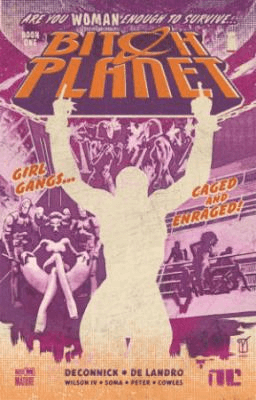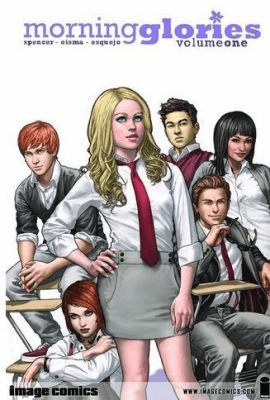I’ve always had a fascination with taboo subjects–those elephants in the rooms of our lives that we ignore because we don’t want to think about it (like death) or because of our culture’s moral attitudes (like sex). And it’s not just the subjects themselves I find interesting. It’s our relationship with those things that really grabs my attention.
Lucky for me, many comic writers and artists are tackling some of these subjects in some fantastic ongoing series. There are many more than the three I’ve listed here (Saga and Rat Queens to name a few), but each of these provide a starting point for conversation about difficult, taboo subjects that I believe we should be talking about openly.

Sex Criminals by Matt Fraction and Chip Zdarsky
Susie is a librarian who loves her work, but her building is in foreclosure and saving it seems hopeless. Jon is a banker–at the very same bank that is foreclosing on Susie’s library–who hates his job and his boss. Jon and Susie meet at a party and discover that they share a, um, special ability. When they have sex, they stop time. The logical next step is to rob Jon’s bank and use the money to pay off the library’s mortgage, obviously.
This is not a happily-ever-after kind of story. While the premise of this series is quirky and it’s filled with humor, it deals with issues like sex, sexuality and mental illness frankly, honestly and refreshingly. If this were a movie it would be rated R at least, but probably X, because, well, there’s a lot of sex.
Although Jon and Susie fall madly in love with each other, they each have their own issues and struggles that affect their relationship. Jon is dealing with a crushing depression, and Susie is stressed out and upset at the prospect of her library closing. The characters that populate this comic don’t all have magical sex powers, and we get to see inside their heads, too: their insecurities about their bodies and their experiences.

Bitch Planet by Kelly Sue DeConnick and Valentine De Landro
This book’s premise is that “non-compliant” women are sent to another planet that’s a giant prison. Their “crimes” range from “seduction” and “patrilineal dishonor” to “assault” and “murder.” Now, some of the women are being allowed to create a sports team, in which they will compete against brutal men’s teams in a sporting event called Megatron. No one expects them to win, but the “fathers” want to do it to raise engagement levels among the general population.
The main character is Kamau Kogo, a black lady who kicks serious butt (in the literal sense). Joining her are women ranging in size and color from 100 lbs to 300 lbs and white to dark skinned. Because they are in a prison, they are naked a lot (in the shower, for processing, etc.). And Valentine De Landro’s art is BEAUTIFUL. Even though there’s a ton of nudity, it’s not overtly sexualized; instead, it’s like an old-school fine art nude x1000–just beautiful and powerful.
DeConnick takes the expectations and pressures society places on women and runs with them. The pressure to be a “good wife” or a “good mother” is not just pressure–it’s the law. If you don’t hold up your end of the deal (i.e., being subservient to men), you get thrown in jail and basically forgotten. It’s the extremism that makes this such a good series. It highlights real issues facing real women today, and points out how ridiculous things can get.
Of course in real life the consequences for ignoring those societal pressures and expectations are usually not so extreme, but for many women, they can be just as damaging emotionally, mentally and physically.
Bitch Planet is full of rage and satire, but it is also a cry for a revolution. Thankfully none of us have to compete in Megatron to make the revolution a reality.

Morning Glories by Nick Spencer and Joe Eisma
In this sci-fi thriller, a group of brilliant sixteen-year-olds with hidden talents find that their dream school isn’t what they expected, and now they can’t leave or contact anyone in the outside world. As a group of freshman work to solve the mystery of Morning Glory Academy and their unique abilities, they encounter murder, time-travel, a plot to thwart MGA’s shadowy agenda, impossible class assignments, brutal field days and all the normal teen stuff like crushes, loneliness and identity crises.
While Morning Glories can be incredibly violent and rather graphic in its depiction of violence, it doesn’t ever become gratuitous. Each violence act and puddle of blood serves the greater story and propels the plot and characters forward. If you are a fan of the television show Lost, you’ll find many similar plot elements and character developments.
Nick Spencer explores different kinds of violence–physical, emotional–and the repercussions. We hear a lot about violence in the news, but we tend to have short memories, and not all violence makes the mainstream media. We’re sad when we hear about a young person with a bright future ahead getting murdered, and we’re sad for the family, but soon enough, we forget.
The family of the victim, of course, can never forget. In Morning Glories we get inside the heads of victims and perpetrators, and see over the long haul how violence shapes these characters, their decisions and their subsequent actions.
If you like to read on the edge, check out one of these comic series. But don’t read them at work!
-Kelly
Are you at work? No? Good!
Check out these titles instantly on Hoopla!Kelly reads, writes and sometimes sews, always with a large mug of tea. Her job as the Clerical Specialist at CLP – West End gives her plenty of ideas for stories that find homes in obscure literary magazines.
